Hyundai IONIQ 6 vs VW ID.7 Touring - Differences and prices compared
Compare performance (650 HP vs 340 HP), boot space and price (37600 £ vs 47100 £ ) at a glance. Find out which car is the better choice for you – Hyundai IONIQ 6 or VW ID.7 Touring?
Costs and Efficiency:
Price and efficiency are key factors when choosing a car – and this is often where the real differences emerge.
Hyundai IONIQ 6 has a noticeable advantage in terms of price – it starts at 37600 £ , while the VW ID.7 Touring costs 47100 £ . That’s a price difference of around 9433 £.
In terms of energy consumption, the advantage goes to the Hyundai IONIQ 6: with 13.90 kWh per 100 km, it’s slight more efficient than the VW ID.7 Touring with 14 kWh. That’s a difference of about 0.10 kWh.
As for electric range, the VW ID.7 Touring performs a bit better – achieving up to 689 km, about 75 km more than the Hyundai IONIQ 6.
Engine and Performance:
Power, torque and acceleration are the classic benchmarks for car enthusiasts – and here, some clear differences start to show.
When it comes to engine power, the Hyundai IONIQ 6 has a decisively edge – offering 650 HP compared to 340 HP. That’s roughly 310 HP more horsepower.
In acceleration from 0 to 100 km/h, the Hyundai IONIQ 6 is convincingly quicker – completing the sprint in 3.20 s, while the VW ID.7 Touring takes 5.50 s. That’s about 2.30 s faster.
In terms of top speed, the Hyundai IONIQ 6 performs distinct better – reaching 257 km/h, while the VW ID.7 Touring tops out at 180 km/h. The difference is around 77 km/h.
There’s also a difference in torque: Hyundai IONIQ 6 pulls somewhat stronger with 770 Nm compared to 679 Nm. That’s about 91 Nm difference.
Space and Everyday Use:
Whether family car or daily driver – which one offers more room, flexibility and comfort?
Both vehicles offer seating for 5 people.
In curb weight, Hyundai IONIQ 6 is a bit lighter – 1850 kg compared to 2191 kg. The difference is around 341 kg.
In terms of boot space, the VW ID.7 Touring offers evident more room – 605 L compared to 401 L. That’s a difference of about 204 L.
When it comes to payload, VW ID.7 Touring hardly perceptible takes the win – 465 kg compared to 430 kg. That’s a difference of about 35 kg.
Who wins the race in the data check?
The Hyundai IONIQ 6 is far ahead overall in the objective data comparison.
This result only shows which model scores more points on paper – not which of the two cars feels right for you.
Costs and Consumption
View detailed analysis
Engine and Performance
View detailed analysis
Dimensions and Body
View detailed analysis
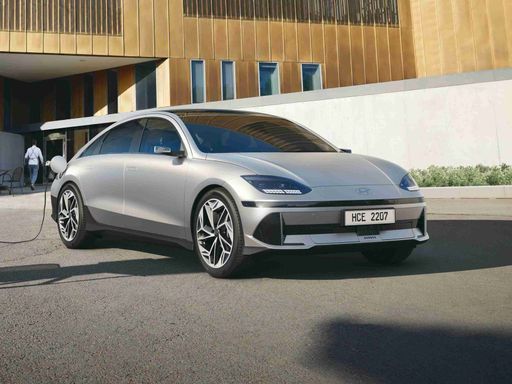
Hyundai IONIQ 6
Hyundai IONIQ 6
The Hyundai IONIQ 6 glides down the road with a poise that feels more runway model than commuter car, its sleek silhouette promising efficiency without trying too hard. Inside, a calm, minimalist cabin packed with clever, usable tech makes it a compelling choice for buyers who want electric motoring that's smart, stylish and quietly practical.
details
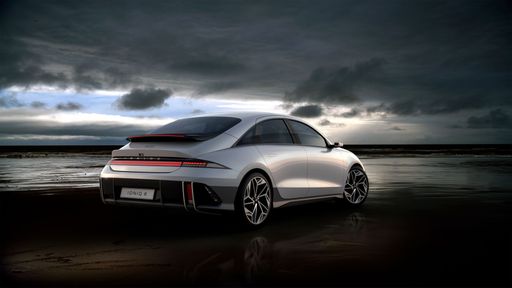
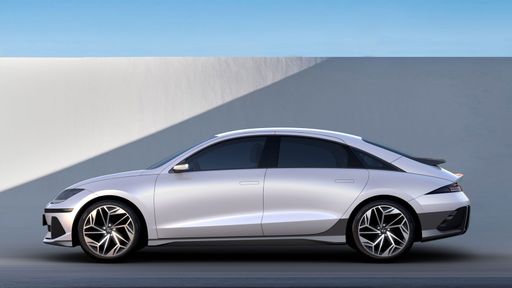
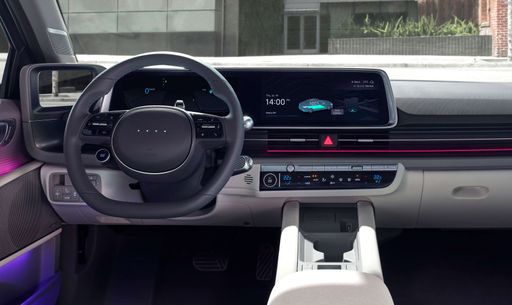
VW ID.7 Touring
The VW ID.7 Touring blends sleek, aerodynamic fastback looks with estate practicality, delivering an electric family car that looks grown-up and feels refined. Inside it's calm and spacious with clever storage and modern tech, swallowing suitcases and weekend plans with ease — a sensible, slightly flashy choice for buyers who want electric comfort without giving up practicality.
details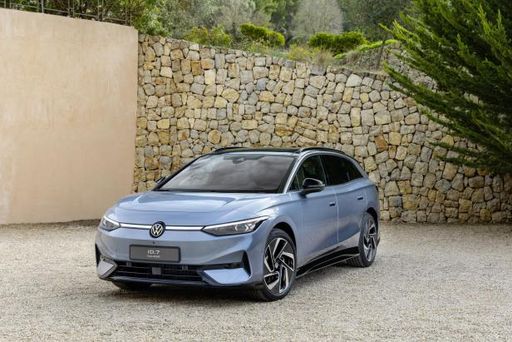
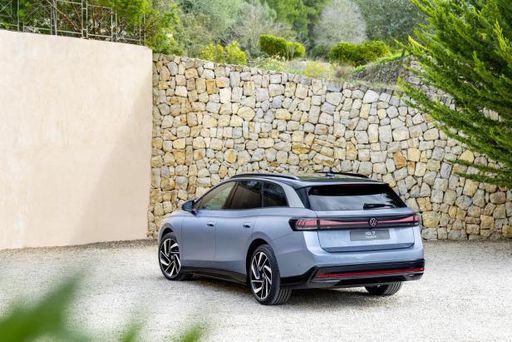
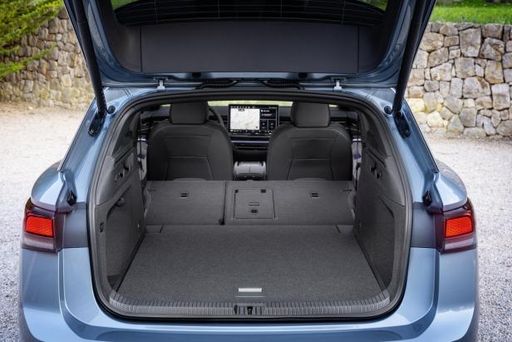
Costs and Consumption |
|
|---|---|
|
Price
37600 - 64300 £
|
Price
47100 - 54900 £
|
|
Consumption L/100km
-
|
Consumption L/100km
-
|
|
Consumption kWh/100km
13.9 - 15.1 kWh
|
Consumption kWh/100km
14 - 16.6 kWh
|
|
Electric Range
429 - 614 km
|
Electric Range
584 - 689 km
|
|
Battery Capacity
53 - 84 kWh
|
Battery Capacity
77 - 86 kWh
|
|
co2
0 g/km
|
co2
0 g/km
|
|
Fuel tank capacity
-
|
Fuel tank capacity
-
|
Dimensions and Body |
|
|---|---|
|
Body Type
Hatchback
|
Body Type
Estate
|
|
Seats
5
|
Seats
5
|
|
Doors
4
|
Doors
5
|
|
Curb weight
1850 - 2095 kg
|
Curb weight
2191 - 2336 kg
|
|
Trunk capacity
401 L
|
Trunk capacity
605 L
|
|
Length
4855 - 4935 mm
|
Length
4961 mm
|
|
Width
1880 - 1940 mm
|
Width
1862 mm
|
|
Height
1495 mm
|
Height
1549 - 1551 mm
|
|
Max trunk capacity
-
|
Max trunk capacity
1714 L
|
|
Payload
425 - 430 kg
|
Payload
459 - 465 kg
|
Engine and Performance |
|
|---|---|
|
Engine Type
Electric
|
Engine Type
Electric
|
|
Transmission
Automatic
|
Transmission
Automatic
|
|
Transmission Detail
Reduction Gearbox
|
Transmission Detail
Reduction Gearbox
|
|
Drive Type
Rear-Wheel Drive, All-Wheel Drive
|
Drive Type
Rear-Wheel Drive, All-Wheel Drive
|
|
Power HP
151 - 650 HP
|
Power HP
286 - 340 HP
|
|
Acceleration 0-100km/h
3.2 - 8.8 s
|
Acceleration 0-100km/h
5.5 - 6.7 s
|
|
Max Speed
185 - 257 km/h
|
Max Speed
180 km/h
|
|
Torque
350 - 770 Nm
|
Torque
545 - 679 Nm
|
|
Number of Cylinders
-
|
Number of Cylinders
-
|
|
Power kW
111 - 478 kW
|
Power kW
210 - 250 kW
|
|
Engine capacity
-
|
Engine capacity
-
|
General |
|
|---|---|
|
Model Year
2022 - 2025
|
Model Year
2024
|
|
CO2 Efficiency Class
A
|
CO2 Efficiency Class
A
|
|
Brand
Hyundai
|
Brand
VW
|
What drive types are available for the Hyundai IONIQ 6?
Available configurations include Rear-Wheel Drive or All-Wheel Drive.




